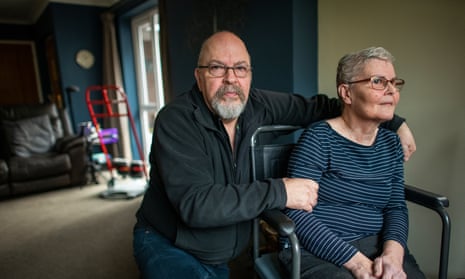Five million people – including children as young as five – provide unpaid care to people with long-term health conditions or problems related to old age, census data for England and Wales has revealed.
With the social care system struggling with rising unmet care demand and about half a million people in England waiting for help, there has been an increase over the past decade in the proportion of people spending at least 20 hours a week on unpaid care, from 4.2% of the population to 4.7%. About 1.5 million people in England and Wales now spend more than 50 hours a week giving unpaid care.
Large minorities of unpaid carers are struggling, and a survey of more than 12,000 carers last year found that a quarter were cutting back on food or heating, a third said their mental health was bad or very bad, and 29% said they often or always felt lonely.
Between 2021 and 2022 there were sharp increases in the numbers of unpaid carers eating into savings and cutting back on leisure, hobbies and seeing friends, the research by Carers UK found.
The census found that the areas with the highest numbers of unpaid carers were also among the most income-deprived, including St Helens in Lancashire, Neath in south Wales, Ashfield and Mansfield in Nottinghamshire and Knowsley in Merseyside, where one in 25 people provided 50 or more hours of unpaid care a week.
Unpaid carers have told the Guardian they have lost friendships, gone through marriage breakdowns, been hospitalised and even contemplated suicide as a result of the pressures of caring for a loved one with limited help.
The Conservatives’ 2019 general election manifesto pledged to introduce leave for working carers, but this has not happened. In June, the Liberal Democrat MP Wendy Chamberlain introduced a private member’s bill aiming to give employees with caring responsibilities up to a week of unpaid carer’s leave annually. It is due to have its third reading in parliament on 3 February.
The total number of unpaid carers fell by 600,000 from the last census in 2011. The ONS said this may be because this time the question was framed differently and it was asked during the pandemic, when Covid restrictions reduced travel and limited visits to people from other households, and there were a higher number of deaths among elderly people, reducing the need for care.
‘I never go anywhere, I never see anyone’
In West Suffolk, Andrew Pearson, 64, said he wanted nothing more than to look after his wife, Amanda, 62, who needs round-the-clock care after being diagnosed with a brain tumour. But it has taken a severe toll. He has been hospitalised with heart problems triggered by staying up all night with her. He has lost contact with friends and family. Feeling “desperate”, he said, he has considered taking his own life.
He gave up work as a locksmith to care for Amanda for six years. In common with many people, he wanted to care for his wife himself so did not ask for help from the social care system until he fell ill with Covid. But when he did, it was not there for them.
“We tried and tried and tried with social services,” he said. “But they offered things that wouldn’t have been any help. I wanted to be able to sleep, more than anything; it was making me ill. But I was always told [night care] was not a possibility.”
When carers came, they arrived at 11am to get Amanda up – too late – and at 6pm to put her to bed – too early. “It was because they didn’t have enough staff,” he said.
after newsletter promotion
He claims a carer’s allowance of £65 a week. The couple used to go climbing in Wales but now, he said, “I never go anywhere, I never see anyone; after a while the invites don’t come any more.”
He added: “Sometimes I think: is it worth it? The only thing that is stopping me ending my life is the one thing that has caused me to want to end it [his caring duties].”
Victoria Sanders, 52, who cares for her 18-year-old daughter, Rose, who has epilepsy and other complex needs, said she would “love a little bit of extra help” but “it’s just not available with the way things are”. Nor is she confident carers would be sufficiently experienced or qualified to respond to Rose’s difficulties, which include frequent seizures.
Caring for Rose while holding down a part-time job as a graphic designer has put a strain on her family. Care demands were a contributory factor in the recent breakdown of her marriage, she said.
“I don’t really have a life, I don’t go anywhere,” she said. “I would love to see the new Avatar film but I can’t. There are lots of things I have missed out on – but she is more important.”
Helen Walker, the chief executive of Carers UK, said: “Without the support provided by unpaid carers, our health and social care systems would quite simply collapse. It is vital that the government recognises the pressing needs of this huge swathe of people and develops a funded national carers strategy for England. This would help millions of carers around the country get the practical and financial support they need to care without putting their health and livelihoods on hold.”
In the UK and Ireland, Samaritans can be contacted on 116 123, or email jo@samaritans.org or jo@samaritans.ie. In the US, the National Suicide Prevention Lifeline is 1-800-273-8255. In Australia, the crisis support service Lifeline is 13 11 14. Other international helplines can be found at befrienders.org.










